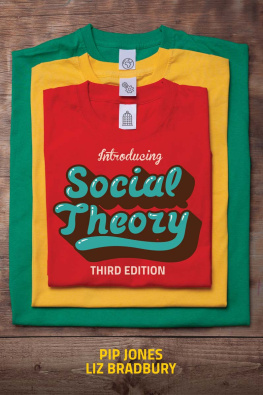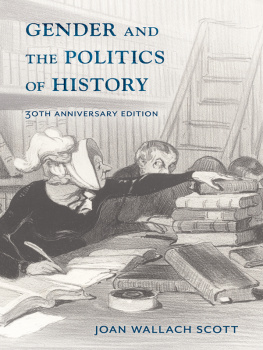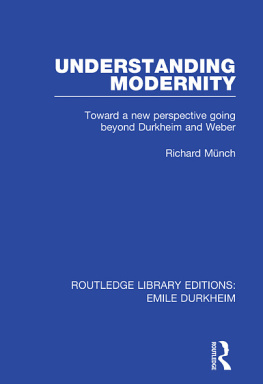Harmless lovers?
This book reconstructs a decisive and neglected aspect of modern social thought: the evolution of modern gender theory from Mary Wollstone-craftat the end of the eighteenth century to the beginning of the twentieth century and Max Weber. It examines the responses of major intellectual figures Comte, Marx, Engels, Mill, Durkheim, Enfantin and Nietzsche to the new woman and womens emancipation in the period immediately following the French Revolution and the Declaration of the Rights of Man. The pressure for social equality between men and women, and the fact that writers like Mary Wollstonecraft actually produced first-class political and social theory, created new tensions within both the private lives of the theorists and social theory itself. The crisis was suppressed in the writing and lives of Marx and Durkheim, who remained attached to the traditional framework, but all the other men examined in this book sought to evolve new ways of living in gender relations. Some of these variations involved a neo-conservatism (Comte), others a new liberalism (Mill), others a version of a new communism (Enfantin, Engels) while some sought pure transcendence (Nietzsche). This book seeks to develop a fresh look at these writers by examining some of the continuities and discontinuities between theory and lived practice. The book will appeal to a general readership as well as to students in theory, gender, womens studies and the history of ideas.
Mike Gane is Senior Lecturer in Social Science at Loughborough University.
Harmless lovers?
Gender, theory and personal relationships
Mike Gane
First published 1993
by Routledge
2 Park Square, Milton Park, Abingdon, Oxon, OX14 4RN
Simultaneously published in the USA and Canada
by Routledge
270 Madison Ave, New York NY 10016
Transferred to Digital Printing 2006
1993 Mike Gane
Phototypeset in Times by Intype, London
All rights reserved. No part of this book may be reprinted or reproduced or utilized in any form or by any electronic, mechanical, or other means, now known or hereafter invented, including photocopying and recording, or in any information storage or retrieval system, without permission in writing from the publishers.
British Library Cataloguing in Publication Data
A catalogue record for this book is available from the British Library.
Library of Congress Cataloging in Publication Data
A catalogue record for this book is available from the Library of Congress.
ISBN 0415094488
0415094496 (pbk)
For M. H. A.
What miracles we harmless lovers wrought
John Donne
This book was initially contracted with Gordon Smith of Unwin Hyman Publishers. Subsequently Unwin Hyman passed into the domain of Routledge, and this project to the sphere of Chris Rojek. I would like to thank both Gordon Smith and Chris Rojek for their interest and support. I have benefited greatly from discussions with many people over issues raised in this book and I would like to thank in particular some members of the board of Economy and Society with whom I have discussed relevant issues; Beverley Brown, Maxine Molyneux, Ali Rattansi and Keith Tribe. Economy and Society has published some of my related papers on gender, and I thank the board for permission to use material from those papers in this book. I have discussed themes from the book with a number of members and students of the Department of Social Sciences at Loughborough University, some of whom have kindly commented on earlier drafts of chapters of the book: Michael Billig, Alan Bryman, Anna Dempsey, Teresa Keil, Jane Little wood, Alan Radley. I am also indebted to groups of students on both undergraduate courses (Sociology of Gender) and postgraduate courses (Womens Studies) at Loughborough, and would like to thank the many students who have contributed to the debates. I have also presented a seminar at Leicester Universitys Department of Sociology, and would like to thank Terry Johnson and Sallie Westwood for their discussion. I have discussed issues concerning Durkheim with W. S. F. Pickering and Herminio Martins at the Centre for Durkheim Studies at Oxford. I have also been helped on these issues by the womens group at Toulouse University (Le Mirail), Simone, and would particularly like to thank Marie-France Brive for her assistance. Some of the chapters of this book were written while I was on study leave at Toulouse University (Le Mirail), and I would like to thank Professor Jean-Michel Berthelot for his hospitality and for his critical comments on the project. I have benefited from discussions with Jeff Hearn who has also commented in detail on parts of the draft manuscript, and I would like to thank Sara Mills, who commented on the whole manuscript. I am also indebted for discussions on all these issues to Monique Arnaud. I should emphasize however that in this work the final responsibility for the interpretations developed, and any deficiencies, is ultimately my own.
Mike Gane
The arrangement of this book, which examines the heterosexual attitudes (often claimed scientific) of selected leading social theorists from 1792 to 1920, requires something of an explanation: why begin with Durkheim and end (via Wollstonecraft, Marx, Godwin, Enfantin, Comte, Mill, Engels and Weber), with Nietzsche? There are a number of reasons. The chapter on Emile Durkheim was first published ten years ago in 1983. It was then the first attempt to excavate and try to examine fully Durkheims position on the question of women. Since then there have been other efforts to do this (notably Rosalind Sydie (1987: 1349), and Terry Kandal (1988: 7988)). Today however, this chapter (and, for me, also the comparable chapters in Sydie and Kandal) remain more of a puzzle than an answer. This book does not resolve the puzzle but it does work towards a statement of its nature.
First, to begin with Durkheims response to the crisis which opened after the French Revolution, is to start with a writer who, today, is still regarded, but in a language which itself is very much in question, as a founding father of sociology (alongside Marx and Weber). A modern discipline which starts with Durkheim (and Marx and Weber) has consequences for the way gender issues are constituted and considered, for Durkheim wrote about gender matters only indirectly, his position on women (unlike his approach to other problems (Gane 1992)) is also explicitly anti-radical. The major gender radicals in the early period of sociology were Enfantin and the Saint-Simonians, Comte, Mill, Engels and Nietzsche; I use the word radical in the sense that it was these individuals who tried to create new, imaginative solutions to the new problems of gender relations in the era dominated by the promise of universal liberty and equality. Of all the sociologists considered here, it is Durkheim who provides the most thoroughgoing scientific argument (though it has to be teased out of his writings) against civic equality for women and provides systematic intellectual grounds for the urgent need to refuse the demand for womens emancipation. In this sense Durkheim is a problem and also a puzzle.
Second, there are severe problems in trying to relate Durkheims writings to the way he lived as a person. Some, notably Greenberg (1976), Lacroix (1981), and Mestrovic (1988), have tried to think about this problem and have had to resort to speculation in the absence of evidence. Durkheims papers were lost in World War Two (see Mestrovic 1988: 19), and few accounts of his life have survived. One will search in vain, for example, even for the dates of birth of his two children (not given in the standard intellectual biography by Lukes (1973) nor indeed in the genealogical family tree in the unpublished part of Lukes thesis on Durkheim). It is known that Durkheim had two children and something is known of his son Andr, since an obituary written by Durkheim exists. Little is reported in the literature about his daughter or Durkheims own relation to her. Unlike the evidence which exists for Marx or Freud and their relations with their wives, virtually nothing exists in comparable form for Durkheim. We know that Durkheims father died in 1896, and we know that at around the time Durkheim was in considerable emotional turmoil and in the process of a dramatic recasting of his general theory to include the force of the sacred. Are the two events connected?





